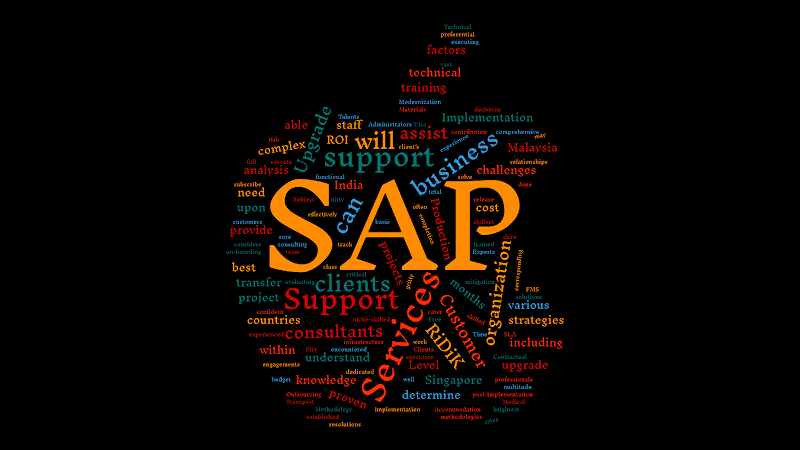SAP (Systems, Applications, and Products in Data Processing):
Introduction: Enterprise resource planning (ERP)
software called SAP (Systems, Applications, and Products in Data Processing) is
widely used by businesses all over the world. Numerous modules from SAP are
available to help businesses manage various facets of their operational
processes. Let's look more closely at a few of the most popular SAP modules.
Top SAP Modules:
·
Financial Accounting (FI): ledger
accounting, accounts payable, and accounts receivable are only a few examples
of financial transactions that are managed by the financial accounting (FI)
module.
·
Sales and Distribution (SD): Managing
sales orders, pricing, billing, and shipping is done through the Sales and
Distribution (SD) module.
·
Materials Management (MM): Inventory,
purchasing, and planning for material requirements are all managed by the
materials management (MM) module.
·
Production Planning (PP): is used to organize
and manage the production process, including capacity planning and material
requirements planning.
·
Human Capital Management (HCM): Payroll,
benefits, and time management for employees are all managed by the Human
Capital Management (HCM) module.
·
Project System (PS) - The management of
project planning, execution, and control is handled by the PS module.
·
Quality Management (QM): The quality
control and quality assurance processes are managed by the quality management
(QM) module.
·
Plant Maintenance (PM) - The management
of maintenance tasks like inspections, repairs, and preventative maintenance is
handled by the PM module.
Because of how well these components work together,
businesses may manage their operations more effectively. Companies can choose
and customise the modules that best meet their needs based on their business
demands.
Finally, SAP provides a variety of modules that can
assist companies in managing their business operations more successfully.
Companies can use SAP to simplify their operations, cut expenses, and boost
overall performance.
The following are a few factors contributing to the
rising need for SAP specialists:
·
SAP is widely utilized by businesses in a
variety of sectors, including healthcare, banking, retail, and manufacturing. The
demand for SAP specialists who can manage and execute SAP software in various
industries has expanded as a result of the SAP market's expansion.
·
Digital Transformation: The need for
digital transformation is evident in the fact that many organizations are
undergoing this process, which entails the fusion of modern business procedures
with cutting-edge technology. These digital transformation programs frequently
include the usage of SAP software, necessitating the need for experts who can
manage and install SAP software.
·
Cloud-Based SAP Solutions - SAP has
created cloud-based products, such SAP S/4HANA Cloud, that give businesses more
adaptability and scalability. Professionals who can manage and deploy
cloud-based solutions are needed as more organisations shift towards them.
·
Emerging Technologies: SAP is constantly
developing and integrating cutting-edge technologies like blockchain, machine
learning, and artificial intelligence into its software. The demand for
professionals who are familiar with these cutting-edge technologies and how
they integrate with SAP software is considerable.
· Globalizations: As more businesses branch
out internationally, there is a growing demand for experts who can administer
and install SAP software across diverse geographies and cultural contexts.
In conclusion, there is a significant demand for SAP
specialists, and this demand is anticipated to increase over the next several
years. The use of SAP software by businesses to run their operations and launch
digital transformation efforts is on the rise. Professionals in a position to
benefit from these opportunities include those who are familiar with SAP
software and developing technologies.
SAP Professional Salary Ranges:
·
The projected salary range for SAP specialists
might vary depending on a number of variables, including geography, education,
industry, experience, and skill in particular SAP modules. The lowest and
highest projected salaries for SAP professionals are listed below:
·
SAP newcomer professionals: A SAP entry-level
professional may earn between $40,000 and $60,000 annually as their base pay.
This would normally apply to someone with an associate's or bachelor's degree
and fewer than two years of experience.
·
Mid-Level SAP Professionals: With roughly five
years of experience and a bachelor's or master's degree, the minimum wage for a
mid-level SAP professional could range from $80,000 to $120,000 annually.
·
Senior-level SAP professionals: With ten or more
years of experience, a master's degree, or an equivalent qualification, a
senior-level SAP professional might earn a minimum salary of $120,000 to
$200,000 annually.
·
The maximum projected income for SAP specialists
might be considerably higher for individuals with specialized knowledge in
particular SAP modules or industries, it's crucial to note. SAP experts who are
knowledgeable with SAP S/4HANA, SAP SuccessFactors, or SAP Ariba, for instance,
can command greater compensation. SAP specialists should anticipate greater pay
when working in sectors like banking, healthcare, or manufacturing.
In conclusion, there are a number of variables that
can affect the predicted income for SAP employees. However, due to the growing
need for SAP specialists, these individuals' pay are typically extremely
competitive.



0 Comments: